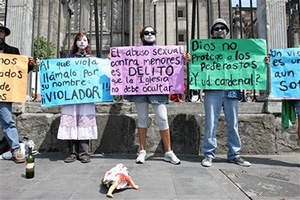 |
 |
 |
 Editorials | At Issue | October 2006 Editorials | At Issue | October 2006  
Sex Scandals Hit Mexican Priests
 Marion Lloyd - Houston Chronicle Marion Lloyd - Houston Chronicle


| | A group of people protest in front of Mexico City's Metropolitan Cathedral on Sunday Sept. 24, 2006 holding various signs reading 'The one that rapes, call him by his name: RAPIST!', 'Sexual abuse against minors is a crime the Church should not try to hide' and 'God does not protect child molesters. Do you Cardinal?'. The protest was held against Mexican Cardinal Norberto Rivera, who has been sued in a California court for allegedly conspiring with Los Angeles Cardinal Roger Mahony to protect Rev. Nicolas Aguilar, charged in California with 19 felony counts of committing lewd acts on a child. (AP) |
When the scandal over pedophile priests rocked the Roman Catholic Church in the United States in 2002, the shock waves barely registered in Mexico.

Now, just four years later, the Catholic Church in Mexico is facing unprecedented scrutiny, its most prominent official has been accused of protecting a convicted sex offender and a raft of criminal suits against alleged pedophile priests are making their way through the courts.

"This is a very key moment," said Elio Masferrer, an anthropologist who has written extensively on Mexico's church. "The victims are starting to become aware of their rights and to demand justice."

Sexual abuse cases against priests were once virtually unknown in Mexico, home to the world's second-largest Catholic population after Brazil.

But over the past few years, experts said, at least a dozen alleged victims have pressed charges. And judges increasingly are convicting the offenders, including one priest who was sentenced Sept. 22 to six years in jail.

A lawsuit filed in Los Angeles last month against Cardinal Norberto Rivera Carrera could embolden even more victims to come forward, activists said.

The lawsuit accuses Rivera, the powerful head of Mexico City's archdiocese, and Cardinal Roger Mahoney of Los Angeles of conspiring to protect a Mexican priest accused of molesting boys in both countries.

The cardinals deny the allegations, which they claim are motivated by greed. The lawyers are seeking an unspecified amount in damages.

The case was filed on behalf of Joaquin Aguilar Mendez, 25, a Mexican man who claims he was raped by priest Nicolas Aguilar in 1994. He says he later reported the incident to police and wrote a letter to Rivera, but got no response. The priest and the alleged victim are not related.

"We hope this will inspire more Mexicans to overcome their fear and denounce their persecutors," said Eric Barragan, a spokesman for the Chicago-based Survivors Network of those Abused by Priests, which is sponsoring the lawsuit. The group opened its first office in Mexico in December and has since received more than 100 calls from alleged victims, he said.

Joaquin Aguilar said he received death threats after going public with his allegations in November.

His American lawyers, who say they were hassled by Mexican immigration authorities after a Sept. 20 news conference in Mexico City, accuse the Catholic Church of orchestrating an intimidation campaign.

Church officials deny it. But the case is a watershed in Mexico, where the church hierarchy has long been seen as untouchable.

Rivera, who had been named as possible successor to Pope John Paul II, is the highest-ranking Mexican church official to be accused in connection with a sex abuse case.

On Sept. 24, protesters waved signs reading, "We don't want kids raped in heaven," and "Call a rapist by his name" outside the capital's main cathedral, where the cardinal was celebrating Mass.

A visibly flustered Rivera later read a statement to reporters insisting he had always been tough on offending priests. He also announced the appointment of two church officials to investigate sex abuse allegations in his diocese.

It was a shift in approach. In 2002, Mexican bishops responded to the pedophile priest crisis in the United States by stating that "dirty laundry should be washed at home."

Rivera himself has openly defended an accused sex offender, Marcial Maciel Degollado, the Mexican founder of a religious order known as Legionaries of Christ.

Nine former members in 1997 had accused Maciel of abusing them when they were boys or teenagers. He denied the accusations. But in May 2006, the Vatican asked Maciel, now in his 80s, to give up "any form of public ministry" and retire to a "life of penitence and prayer."

On Sept. 24, the cardinal urged Nicolas Aguilar to confront the "terrible charges" against him and turn himself in to police "for the good of his own conscience and to avoid any more damage to the church."

Aguilar, 65, is believed to be hiding out in his native Puebla state, where witnesses said he occasionally celebrates Mass and sells religious music outside churches.

In 1997, he was charged with sexually abusing four boys in the state, according to Mexican news reports. He was convicted on one count in 2004, but the judge waived the sentence, citing the statute of limitations.

California authorities have charged the priest with 19 felony counts of committing lewd acts on a child while he was in Los Angeles for nine months in 1987 and 1988. Those cases are pending, Joaquin Aguilar's lawyer said.

On Tuesday, the Puebla government ordered police to detain Nicolas Aguilar for questioning. And the state's human rights commission chief urged more victims to denounce Aguilar in hopes of charging him again.

It may not be easy.

Unlike in the United States, where sex abuse victims can report crimes until they turn 26, in Mexico they have only six months to press charges. | 
 | |
 |



